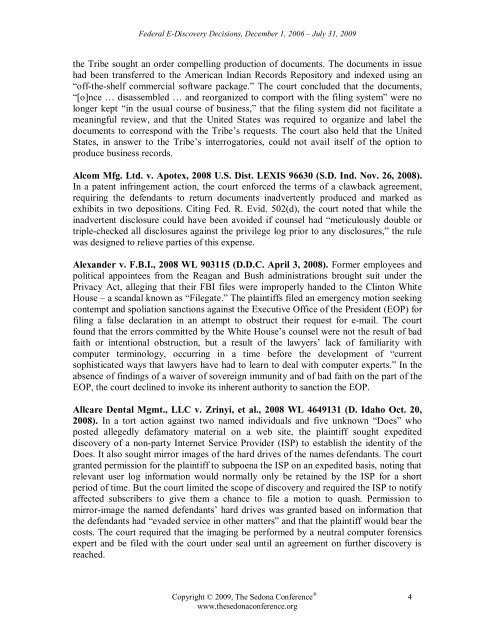Federal Court Decisions Involving Electronic Discovery, December 1 ...
Federal Court Decisions Involving Electronic Discovery, December 1 ...
Federal Court Decisions Involving Electronic Discovery, December 1 ...
You also want an ePaper? Increase the reach of your titles
YUMPU automatically turns print PDFs into web optimized ePapers that Google loves.
<strong>Federal</strong> E-<strong>Discovery</strong> <strong>Decisions</strong>, <strong>December</strong> 1, 2006 – July 31, 2009<br />
the Tribe sought an order compelling production of documents. The documents in issue<br />
had been transferred to the American Indian Records Repository and indexed using an<br />
“off-the-shelf commercial software package.” The court concluded that the documents,<br />
“[o]nce … disassembled … and reorganized to comport with the filing system” were no<br />
longer kept “in the usual course of business,” that the filing system did not facilitate a<br />
meaningful review, and that the United States was required to organize and label the<br />
documents to correspond with the Tribe’s requests. The court also held that the United<br />
States, in answer to the Tribe’s interrogatories, could not avail itself of the option to<br />
produce business records.<br />
Alcom Mfg. Ltd. v. Apotex, 2008 U.S. Dist. LEXIS 96630 (S.D. Ind. Nov. 26, 2008).<br />
In a patent infringement action, the court enforced the terms of a clawback agreement,<br />
requiring the defendants to return documents inadvertently produced and marked as<br />
exhibits in two depositions. Citing Fed. R. Evid. 502(d), the court noted that while the<br />
inadvertent disclosure could have been avoided if counsel had “meticulously double or<br />
triple-checked all disclosures against the privilege log prior to any disclosures,” the rule<br />
was designed to relieve parties of this expense.<br />
Alexander v. F.B.I., 2008 WL 903115 (D.D.C. April 3, 2008). Former employees and<br />
political appointees from the Reagan and Bush administrations brought suit under the<br />
Privacy Act, alleging that their FBI files were improperly handed to the Clinton White<br />
House – a scandal known as “Filegate.” The plaintiffs filed an emergency motion seeking<br />
contempt and spoliation sanctions against the Executive Office of the President (EOP) for<br />
filing a false declaration in an attempt to obstruct their request for e-mail. The court<br />
found that the errors committed by the White House’s counsel were not the result of bad<br />
faith or intentional obstruction, but a result of the lawyers’ lack of familiarity with<br />
computer terminology, occurring in a time before the development of “current<br />
sophisticated ways that lawyers have had to learn to deal with computer experts.” In the<br />
absence of findings of a waiver of sovereign immunity and of bad faith on the part of the<br />
EOP, the court declined to invoke its inherent authority to sanction the EOP.<br />
Allcare Dental Mgmt., LLC v. Zrinyi, et al., 2008 WL 4649131 (D. Idaho Oct. 20,<br />
2008). In a tort action against two named individuals and five unknown “Does” who<br />
posted allegedly defamatory material on a web site, the plaintiff sought expedited<br />
discovery of a non-party Internet Service Provider (ISP) to establish the identity of the<br />
Does. It also sought mirror images of the hard drives of the names defendants. The court<br />
granted permission for the plaintiff to subpoena the ISP on an expedited basis, noting that<br />
relevant user log information would normally only be retained by the ISP for a short<br />
period of time. But the court limited the scope of discovery and required the ISP to notify<br />
affected subscribers to give them a chance to file a motion to quash. Permission to<br />
mirror-image the named defendants’ hard drives was granted based on information that<br />
the defendants had “evaded service in other matters” and that the plaintiff would bear the<br />
costs. The court required that the imaging be performed by a neutral computer forensics<br />
expert and be filed with the court under seal until an agreement on further discovery is<br />
reached.<br />
Copyright © 2009, The Sedona Conference ® 4<br />
www.thesedonaconference.org
















